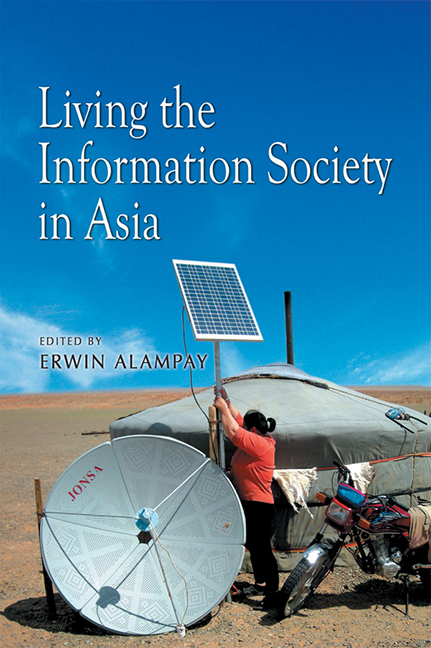Book contents
- Frontmatter
- Contents
- Foreword
- Preface
- List of Abbreviations
- Contributors
- Introduction: Perspectives of ICT Research in Asia
- 1 What Would Durkheim Have Thought? Living in (and with) the Information Society
- 2 What Is a Mobile Phone Relationship?
- 3 Technologies of Transformation: The End of the Social or the Birth of the Cyber Network?
- 4 Becoming Mobile in Contemporary Urban China: How Increasing ICT Usage Is Reformulating the Spatial Dimension of Sociability
- 5 Mobile Religiosity in Indonesia: Mobilized Islam, Islamized Mobility and the Potential of Islamic Techno Nationalism
- 6 Moral Panics and Mobile Phones: The Cultural Politics of New Media Modernity in India
- 7 Stories from e-Bario
- 8 Life and Death in the Chinese Informational City: The Challenges of Working-Class ICTs and the Information Have-less
- 9 Institutional Responses to GIS Adoption for RPTA in Local Governments
- 10 Customer Acquisition among Small and Informal Businesses in Urban India: Comparing Face-to-Face and Mediated Channels
- 11 The View from the Other Side: The Impact of Business Process Outsourcing on the Well-being and Identity of Filipino Call Centre Workers
- 12 Empowering Thai Homeworkers through ICTs
- Index
Foreword
Published online by Cambridge University Press: 21 October 2015
- Frontmatter
- Contents
- Foreword
- Preface
- List of Abbreviations
- Contributors
- Introduction: Perspectives of ICT Research in Asia
- 1 What Would Durkheim Have Thought? Living in (and with) the Information Society
- 2 What Is a Mobile Phone Relationship?
- 3 Technologies of Transformation: The End of the Social or the Birth of the Cyber Network?
- 4 Becoming Mobile in Contemporary Urban China: How Increasing ICT Usage Is Reformulating the Spatial Dimension of Sociability
- 5 Mobile Religiosity in Indonesia: Mobilized Islam, Islamized Mobility and the Potential of Islamic Techno Nationalism
- 6 Moral Panics and Mobile Phones: The Cultural Politics of New Media Modernity in India
- 7 Stories from e-Bario
- 8 Life and Death in the Chinese Informational City: The Challenges of Working-Class ICTs and the Information Have-less
- 9 Institutional Responses to GIS Adoption for RPTA in Local Governments
- 10 Customer Acquisition among Small and Informal Businesses in Urban India: Comparing Face-to-Face and Mediated Channels
- 11 The View from the Other Side: The Impact of Business Process Outsourcing on the Well-being and Identity of Filipino Call Centre Workers
- 12 Empowering Thai Homeworkers through ICTs
- Index
Summary
It is with great pleasure that the International Development Research Centre (IDRC) supported both holding the “Living the Information Society” conference in Manila (23–24 April 2007), as well as the publication of some of the conference's more informative proceedings. IDRC is a Canadian Crown corporation that works in close collaboration with researchers from the developing world in their search for the means to build healthier, more equitable, and more prosperous societies. For IDRC, Information and Communication Technologies (ICTs) are important, yet not enough is known about how ICTs have a role in specific sustainable development outcome areas. The “Living the Information Society” conference and this publication take a few more steps to fill that glaring knowledge gap.
In many of the conferences that focus on ICTs, there is a dominant narrative underlying the proceedings which looks at access to ICTs as generally a positive thing. A more nuanced explanation, that this publication espouses, is that ICTs are powerful tools, and that ultimately it is the people who use them and the environments in which they are used that decide whether they are a force for helping or hindering the development of communities. However, a failing found in much of the research on the effects of the Information Society in Asia, is that it has not given an adequate picture of how and to what extent ICT tools, applications and services have either helped or hindered the development of people, communities, and countries. For example, the relationship between ICTs and poverty, as well as the intricacies of the socially transformative effects of ICTs, are still poorly understood. Living the Information Society in Asia contributes to the process of drawing a more representative and honest picture of these interventions and interactions.
Rich Ling looks at the impact of mobiles on increasing social cohesion and ties, thus leading to “the development of a local ideology that also contributes to the strength of these ties”. Raul Pertierra finds that mobiles have penetrated the private and public spheres, “including religion, politics and the economy”. He further states that “they affect not only relationships with the outside world but also transform orientations in the inner world”. Bart A.
- Type
- Chapter
- Information
- Living the Information Society in Asia , pp. vii - viiiPublisher: ISEAS–Yusof Ishak InstitutePrint publication year: 2009

